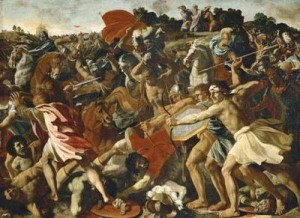For the past year I have been reading everything I can get my hands on about the violence of God in the Bible, and especially in the Old Testament. The reason is that I am trying to figure out how to reconcile Jesus’ command to love our enemies with all the commands of God in the Old Testament to slaughter them.
 So it was with interest that I recently read the new book by Boyd Seevers, Warfare in the Old Testament. Though the book provided very little in the way of trying to justify or explain why God sent His people into war, it was an enlightening and helpful book explaining how those wars were carried out.
So it was with interest that I recently read the new book by Boyd Seevers, Warfare in the Old Testament. Though the book provided very little in the way of trying to justify or explain why God sent His people into war, it was an enlightening and helpful book explaining how those wars were carried out.
The book essentially looks at the warfare tactics and military weapons used by various cultures in the Old Testament era. It surveyed the methods used by Israel, Persia, Egypt, Philistia, Assyria, and Babylon.
You might think that such a book would be boring to all but those who were interested in warfare tactics and weaponry, but I found the book to be enjoyable to read and helpful in understanding what people in the Old Testament thought about war and how it was to be carried out. Each section began with a fictionalized story about a person, soldier, or commander within the ranks of these armies, and showed what they thought about their actions and why they were going to war. This helps the reader identify with the soldiers and descriptions that follow regarding the weapons and tactics that were used by the various cultures.
Two things stood out for me from this book.
First, every culture tied warfare to worship. To go to war against others was always considered to be an act of obedience to the command and instructions of their god. People went to war because they believed their god was telling them to do so and would protect them in their efforts. Though I already knew this to be the case, this book really impressed upon me how central worship was to warfare in the Old Testament era.
But more than that, it made me wonder: Did I really believe that the Egyptians, Persians, or Babylonians were commanded by their gods to go attack other nations? I do not believe that. I believe that this is how they justified their own decisions to go to war. Since that is so, why then do I believe that God actually commanded Israel to go to war? Could it not be that they also were simply using God to justify their own decisions to go to war? Such a thought has numerous theological ramifications for how we understand God and how we read the Old Testament, which I am not sure I have the courage to follow.
The second element of this book which stood out for me is that one of the longest descriptions in the book about how an army followed Yahweh’s instructions to go to war was in the chapter about how Babylon went to war against Israel. Seevers writes this:
Nebuzaradan then looked at the despondent, confused Judeans preparing for their journey into exile, a journey from which most would never return. Nebuzaradan shook his head. He had grown up in a culture that worshiped other gods, but he served Yahweh better than most of these Judeans had done. He understood well that Yahweh expected real loyalty from his people,which they hadn’t displayed (p. 260).
 Isn’t that interesting? The Babylonians followed Yahweh into battle against Yahweh’s people. I knew the truth of this from the Old Testament passages that talk about this, bu it was interesting read it from the perspective of the Babylonian commander.
Isn’t that interesting? The Babylonians followed Yahweh into battle against Yahweh’s people. I knew the truth of this from the Old Testament passages that talk about this, bu it was interesting read it from the perspective of the Babylonian commander.
Anyway, if you are interested in Old Testament backgrounds, this book would be a good addition to your library since warfare plays a huge role in nearly all the Old Testament books. If you want to learn about how war was carried out in Israel and the surrounding nations from about 1500-400 B.C., Warfare in the Old Testament by Boyd Seevers will be extremely helpful.




I don’t think there is much difference in the OT Hebrews justifying their wars as God ordered than the Jihadists doing so today.
The only and most important difference was that, God Ordained the wars
Says…the people who waged the wars in the book they wrote. It is hard to swallow that the Creator of the billions of planets, stars and life forms in the Universe told a ragtag group of tribesman to go out and massacre his own creations for real estate. It is like reading American history written by white people and ignoring the history as seen from the indigenous people. Of course if you are an inerrant Bible believer we have a substantial disagreement.
Yep. I think I will pretty much end up agreeing with you. With a slight twist …
Reading such accounts does give one pause. Just as many nations decided the god of their religion told them to go to war (gods most Christians do not believe were really god), did the political/religious leaders of ancient Israel convince themselves and the nation that Yahweh was sending them to slaughter their enemies? Was that merely their perception and that is what we find reported in the “Old Testament”, or did Yahweh actually tell them to slaughter the enemy? We can’t prove the case either way, and for me either answer has little or no affect on my faith.
Great points, Sam.
Although, if it could be proven that Yahweh did in fact command the slaughter of women and children, how would this not affect your faith? What would you think of Yahweh … and especially if Jesus is the representation of Yahweh?
I’d probably more or less go along with Randy’s comment above. I have serious doubts that God ordered Israel to slaughter anyone. Israel may have thought or claimed God told them that. Even if it could be proven that God did order the slaughter, that would not affect my faith. I would think that God for reasons unknown to me behaved differently in the distant past than he does today. However, I believe he behaves substantially the same.
When masses of people die today, there are those who say it was at God’s hand, because he is mad at (whomever) because of (whatever the speaker is against and assumes God is against). Could it not be that when typhoons strike and kill thousands, buildings fall down, cars crash and so on that those things are caused directly or indirectly by the hand of man? So it has been and so it shall be.
hmmmm warfare in the old statement sound like the book of sun Tzu to me. But still does not represent the violent of God in the old testament.
there is question to ponder though. is God entitled to do whatever He please since He is the creator?isHe not have a right to claim back His belonging( Israel), to get their attention to come back to Him? after all, His bride did prostitution to the idol, right?
I don’t think ownership includes the right to do whatever the owner wants. If I own a dog, this doesn’t mean I can torture it or teach it to maim children, or whatever.
Yes, I agree with you on this case.. but would it be any distinct right between the creator and the creation?
God is always misunderstood on this case, I think….
So, you would not agree with His decision to raise another kingdom to make a war with Israel so that Israel come back again to Him? ( sorry.. only simple question.. I did not try to judge you or anything by this question…. I just want to know your opinion) 🙂
whatever the case, i think that since we believe in God, then God becomes the barometer for measuring what commands are right or actions that are right. then it means that when God tells us not to kill, we shouldn’t kill until he orders us otherwise. when he tells us to kill, his commands i think are final and truth and right, then we can go ahead and kill because he has commanded. it then follows that if he tells us not to kill and we refuse to, we are sinning against him by disobeying his orders. the big questions, how does one know that it is God who is instructing to do something which is believed to be morally and ethically wrong?